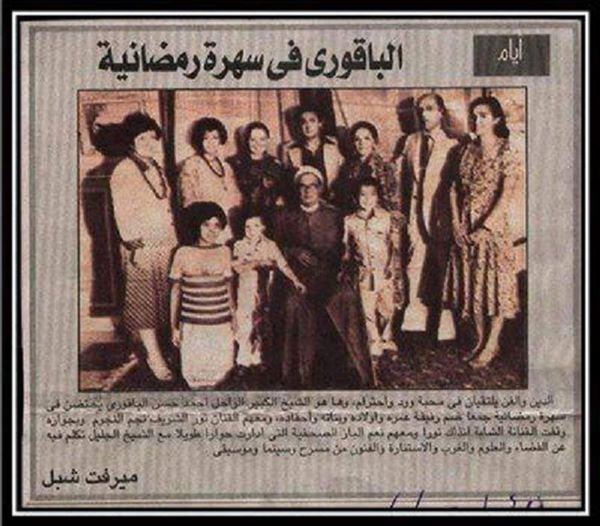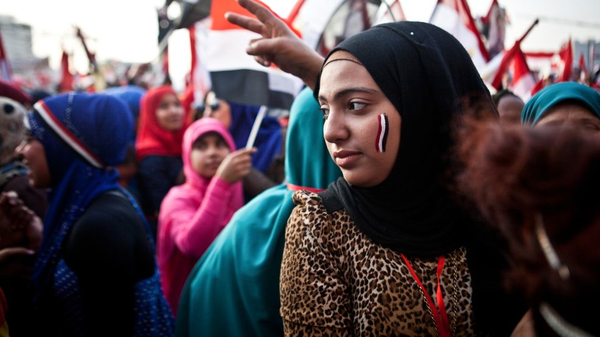Article originally published on Nervana1.org. Subtitles in video above by Nervana Mahmoud
The debate around Islamic headscarves (Hijab) and an Islamic dress code for women is still raging in Egypt. Sheikh Ali Gomaa, an internationally known Islamist jurist and Egypt’s ex-Grand Mufti (top interpreter of religious edicts issued by Muslim clerics), recently joined the debate with some very surprising and alarming comments.
On live television, Sheikh Gomaa not only reaffirmed that headscarves (Hijab) are mandatory in Islam; he labeled any woman who disputes this interpretation as an infidel. Moreover, he said women who reject the Hijab are “stupid, naive and ignorant.”
His comments have raised fears among non-Islamist Egyptians that supposedly moderate mainstream scholars are now giving their blessing to new institutionalized Islamism.
In Egypt, the dress code for women has been controversial for nearly 100 years. The controversy started in 1919, when many women took off their veils as a gesture of support for Egypt’s freedom from British occupation. Political Islamist groups, however, such as the Muslim Brotherhood, have always campaigned for a strict Islamic dress code that includes covering the head as a minimum requirement for Muslim women. The group’s supporters resorted to social coercion to spread their message, using fear tactics (such as threats of punishment in the afterlife) to ensure adherence to the dress code. Salafists have opted for an even blunter approach, with a sharper dose of social coercion against women in their social circles.
Until recently, and even during Islamist Morsi’s tenure, leading mainstream religious scholars have chosen their words carefully to avoid being perceived as harshly critical of non-Hijabi women. These scholars have been happy to appear on TV with non-Hijabi women to discuss various religious topics. Many observers interpreted this attitude as a sign of a moderate approach toward women’s rights. Islamists, on the other hand, have viewed this as hypocritical and a sign of appeasing the ruling elite and its faux liberalism image.
While Sheikh Gomaa has no official position, his views have always reflected the country’s religious trends. He is known for expressing some progressive views on democracy, female genital mutilation, and other issues. Nonetheless, his recent comments on the Hijab are troubling for many reasons. Sheikh Gomaa has now divided non-Hijabi women into two groups, sinners and infidels. Sinners are those who acknowledge Hijab as a must, but fail to adopt it. Infidels, in his view, are those who openly challenge the concept of mandatory Hijab.
Interestingly, Sheikh Gomaa added a caveat stating that only a judge can issue a verdict of blasphemy or apostasy against defiant non-Hijabi women. As an ex-Mufti, Sheikh Gomaa is fully aware that Egypt’s judiciary is not composed of religious scholars, and that civil judges are in no position to judge religious matters. Therefore, inserting this issue into the subtle mix of religious and civil matters in the judiciary is risky and could lead to endless cases of injustice and encroachment on civil rights.
Additionally, his views could lead to a culture of bullying against non-Hijabi women and possibly create legal traps for any outspoken women. Sheikh Gomaa’s insistence that defiant non-Hijabi women could face court cases will potentially open the gates of hell for Muslim women who dare to challenge traditional views. These women will find themselves in a defensive position, having to somehow prove to a judge they are indeed “good Muslims.”
Lastly, while it is hard to know what the real motives behind Sheikh Gomaa’s recent harsh views are, they seem to be part of a larger campaign by mainstream Al-Azhar-affiliated scholars to monopolize the interpretation of religious scripts and block any efforts by outsiders to advocate any views deemed too liberal. An example is the recent legal case against researcher Islam Beheiry
Few days after Sheikh Gomaa’s comments, mysterious pro-headscarf graffiti has appeared at the Cairo University metro station. Also worth mentioning, in a 2014 Egyptian television program, a non-Hijabi woman was forced to wear the Hijab in order to join in a debate on women rights and Islam with two scholars ____ the same two scholars who debated researcher Islam Beheiry.
Those who advocate monopolizing religious studies under the umbrella of Al-Azhar claim it can prevent the chaos of extremist fatwas (religious edicts) issued by radical clerics who glamorize radicalism and extremists groups. That may indeed sound logical and plausible, particularly as groups such as Isis are waging a barbaric wave of terror throughout the Middle East. However, Al-Azhar scholars, including Sheikh Gomaa, appear to be adopting a strict approach to controversial issues, including women’s dress code, possibly as a way to appeal to conservative crowds that have drifted away from Al-Azhar towards political Islam.
However, if theology is to be considered a science, then like all other sciences, it should be open to constant scrutiny and review. Islamic scholars like Sheikh Gomaa, however, seem to want it both ways. On the one hand, Islamic scholars resist outside scrutiny of their own views, while on the other hand, they are reluctant to revise what has been mostly regressive male-dominant religious scholars who persistently downgrade Muslim women to second-class citizen status.
The current debate around headscarves reflects a larger struggle within Egypt regarding the meaning of moderate Islam. Mainstream scholars seem to advocate the concept of tolerating sinners like non-Hijabi women as a sign of moderate Islam. Others reject it and, instead, seek a reformed interpretation of Islamic texts that will allow the inclusion of many liberal Muslims, including non-Hijabi women, within a wider, more diverse Islamic umbrella.

Many fondly remember moderate Al-Azhar scholars such as Sheikh Mahmud Shaltut. In fact, Sheikh Al-Bakoury and the legendary Quran reciter, Shaykh Abul Einein Sheisha, were both happy to be photographed with their non-Hijabi wives and daughters. Egyptian women and youth are now asking, what went wrong? Why are current scholars now more intolerant?’
Egyptian women should not be forced to wear the scarves just to please some Islamic scholars. Islam in Egypt has always been a tolerant, inclusive faith. Institutionalizing regressive Islamism within state pillars is not the way forward for Egypt. Egypt did not oust the Muslim Brotherhood, only to get a far worse model of Islamism.
Article originally published on Nervana1.org.







Comments (14)
[…] http://egyptianstreets.com/2015/05/13/women-who-reject-the-hijab-are-stupid-naive-and-ignorant-says-… […]
It’s so sad and depressing for me to watch the rest of the civilized world become more secularized as time moves on and Egypt reversing the trend and becoming more extremist in their ideology. In the 1950’s and 60’s we never had women wearing the full niqab, now if you walk in Cairo you would think you’re in Saudi Arabia.
All that Gulf investment into Egypt not only brought in money into Egypt, but unfortunately brought a lot of fundamentalist and backwards thinking ideology. This has been going on since the 70’s.